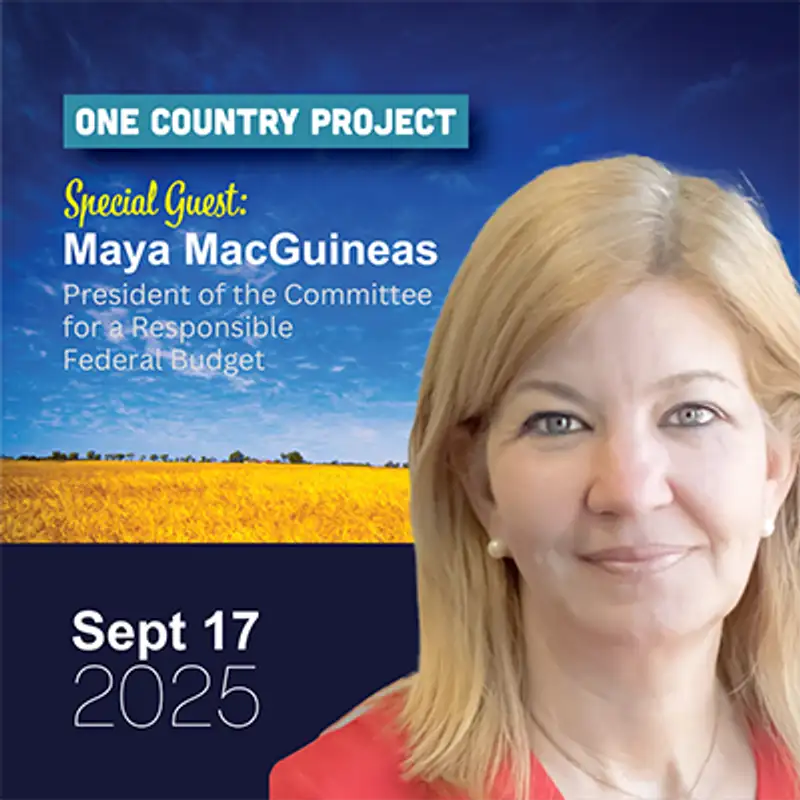Drowning in Debt: A National Security Risk
Heidi Heitkamp [00:00:04]:
Hey, welcome to the Hot Dish, comfort food for rural America. I'm Heidi Heitkamp.
Joel Heitkamp [00:00:09]:
And I'm Joel Heitkamp. Before we get to our guest, we want to remind you that your thoughts and opinions matter to us. Tell us what's going on around you and what you want to hear us talk about.
Heidi Heitkamp [00:00:23]:
Email us your thoughts. Our email address is podcast@onecountryproject - all one word - .org.
Joel Heitkamp [00:00:31]:
And follow the One Country Project on Bluesky and Substack.
Heidi Heitkamp [00:00:40]:
I'm here with Maya MacGuineas, the President of the Committee for a Responsible Federal Budget. And full disclosure, I'm also on her board, care deeply about this issue. And she has been in the trenches for almost ever. I think when people talk about nationally about budget responsibility, her name is the first name that's on everyone's lips. And I think it's really important that the work that you do gets a broader audience. And as you know, one of the things that I've been passionate about, Maya, is not just talking in the beltway to getting out and just, you know, people kind of know that our debt problem is a problem. I don't think they really understand the consequences.
Heidi Heitkamp [00:01:22]:
And so I wanted to just welcome you to the Hot Dish and thank you so much for being on.
Maya MacGuineas [00:01:27]:
I'm excited for our discussion. You're one of the folks who has been there in the trenches in Washington, working on it, and you know how hard it is. So I'm eager to have a conversation to try to connect this issue to people and their lives.
Heidi Heitkamp [00:01:40]:
Before we get into kind of long term challenges, let's talk about what's currently happening. You're there in Washington watching this potential government shutdown. Once again, it just, if nothing else shows the dysfunction, how does that impact the work that you're doing? Is this an extra opportunity, Maya, to have the conversation, or does it get even more difficult to have a fiscal responsibility conversation?
Maya MacGuineas [00:02:08]:
On one hand, this issue only gets attention when things are going really badly and people realize what a problem we have. And certainly when our lawmakers can't even agree and agree to keep the government open and operating and pass budgets, which is the first responsibility, that is something that puts this back on the agenda. I will say, though, at the same time, this is just another kind of example for normal people who just say, these guys can't do anything. They can't get along. They can't run the government. Everything is a crisis. And instead of saying sort of getting people fired up like, okay, we need to make big reforms. We need to change our budget process and more importantly, our budget content.
Maya MacGuineas [00:02:49]:
I think they just throw up their hands and say they can't do anything right. And so in the end, we talk about the issue, we talk about the importance of making reforms, but it doesn't help to activate people to really tell their members of Congress, hey, we want to make changes. We're behind this. This is what we need to do. So I think we need to have specific solutions at moments like this and try not to have just another round of infighting that so many of us are tempted just to tune out.
Heidi Heitkamp [00:03:17]:
I don't think there's any doubt about the challenges going forward, but I want to talk about a couple things. The Committee was particularly active during the dialogue about the Big Beautiful Bill, the latest reconciliation package. And the challenge that you had is so much of what was in that Bill was, was actually a continuation of current tax policy. And so it was hard to convince people that this was, you know, dire. But the numbers that you have talked about as a result of the big beautiful bill and not looking at making strategic changes during that process. Could you talk a little bit about those numbers, where you came up with those numbers and how they affect the budget trajectory long term?
Maya MacGuineas [00:04:02]:
Absolutely. We spend a lot of time, whenever policies are going on, trying to pull together the numbers and make them as accessible as possible for people to look at. I will acknowledge we do it still. It's pretty wonky. But you can boil a lot of these things down to that. One of the ways that people try to make bills look cheaper is make policies only temporary. So we look at things and we look at them over 10 years, and what's happened more often than now is that people say, well, this tax cut or this spending policy is only going to last for, say, three years. And then the price tag is a third, more than less than a third of what it actually would cost for something to happen.
Maya MacGuineas [00:04:43]:
So it's a quick way that people try to make bills look cheaper. That happened with the two, the tax cuts that we had in 2017. Many of them were expiring, and it's a trick that tends then when we have to decide whether to reauthorize them. Because nobody's not going to vote for a tax cut that's already there because it will infuriate the constituencies, and so it makes it more likely that policy will continue. What happened this time is people made that case. Oh, it's just a continuation of policy. Set aside that we also added a number of additional tax cuts and some spending cuts, but not nearly enough to pay for them.
Maya MacGuineas [00:05:18]:
And we ended up with a huge cost above what we were already expecting to see in increases in debt over the next 10 years and adding more than $4 trillion to the national debt. That comes almost all from tax cuts, but from some spending increases and then other spending reductions on net, it would add about $4 trillion. We have models where we estimate this, and we of course, also look at all the estimates of other outside organizations. Pretty much everybody agreed with those consensus numbers, with one notable exception, which was the White House kept putting out numbers that were just way far off from what anybody else was credibly talking about, because they made claims that a bill like this would have such huge positive effects on economic growth. And just to be clear, the way that this works is when you cut taxes, it does indeed grow the economy, but when you increase the debt, it slows the economy. And what experts are finding out now is that the slow, slower growth from the higher levels of debt is actually outweighing the growth from tax cuts because our debt is so high. And so as we looked at these numbers, we came up with the catastrophically bad news that not only were they borrowing trillions of dollars, the overall economic effects, or so called dynamic scoring, would even add to that bill. Further, I guess I would just say make the simple point.
Maya MacGuineas [00:06:40]:
Our debt is at near record levels. Our deficits are the highest they've ever been outside of emergency time. We should not be passing any legislation that makes the debt worse. And we can go into all the reasons why, but we should look at every one of these bills and say, will it make the debt better? Will it bring us to a pretty widespread target these days of bringing the deficit down from its 6% of GDP to 3% of GDP. Cutting it at least in half, trying to get to balance, is probably too much of a heavy lift for the moment. But can we cut it in half as a share of the economy? And, and if it will make things worse, we should reject that because the effects of the debt are so damaging in so many ways. And we are at a really troubling moment in terms of all the warning signs about where our fiscal situation already is without even making it worse, which unfortunately, this bill did. It's not a judgment on whether the tax cuts are good or bad or the spending cuts are good or bad.
Maya MacGuineas [00:07:38]:
I say this from a policy neutral perspective. People will have different feelings about if they like the policies or not. Our position would just be you have to offset the costs and not add to the debt. And frankly, things are so bad. We should be making sure all bills reduce the debt at the same time, they're doing the other things they may want to do as well.
Heidi Heitkamp [00:07:57]:
Now, in farm country, things are very bad. Commodity prices are low. The tariffs that have generated revenue but have devastated a lot of industries, especially agriculture and the agricultural markets. There's a lot of push for more spending, a bailout for farmers. There's a lot of dialogue about how that would look. And again, more spending. And so I want to explore with you how you can make this relevant to everyday people. I will tell you, as somebody who has been in the public life for a long time, people always raise the debt with me, especially conservatives.
Heidi Heitkamp [00:08:36]:
Oh, I hate the debt. I hate the debt. But no one seems to vote on how much they hate the debt, you know, so there's no real benefit to a politician to be a fiscal warrior to take fiscal responsibility because it requires two things that are horribly unpopular, cutting spending and increasing taxes. So make the case to the people listening to this podcast that this is the first question they should ask their congressperson or. Or their senator in a town hall. What are they going to do about the debt? Make that case true.
Maya MacGuineas [00:09:07]:
I've got to be the only person who goes to the voting booth and says, who will raise my taxes the most and cut my spending the most and vote for them. Not because I like either of those two things, nobody does or would, but because I understand and believe that the risks of not doing so are so detrimental to our country. So listen, there's a whole host of massive amounts of damage that large debt levels do, and it affects whatever issue you care about. But it slows economic growth because it crowds out other investments. It leads to higher interest rates, it leads to higher inflation. It does all of these things that make your household economy much worse. It's harder to borrow on your credit card, for your mortgage, for your auto loans. Any of those things become more expensive, more difficult, and ultimately, it slows your standard of living.
Maya MacGuineas [00:09:55]:
Every one of us is making less right now than we would have if we had borrowed responsibly in the past. It's hard because we don't see, oh, we'd be richer today if we hadn't done that reckless borrowing. But we would, and that will continue to deteriorate in the future. Second, when there's an emergency like Covid or something else, when you should borrow, we've been able to borrow without it putting us in a deeper recession. If we keep borrowing, we won't have that privilege that comes from being the reserve currency and the safe haven. If those things change, our next emergency or the one after that will turn into a dangerous debt spiral. If we try to borrow at that time to fight the emergency, it leads to interest payments that are pushing out everything in the budget. As you know, interest payments are now larger than national defense.
Maya MacGuineas [00:10:43]:
They are the second largest item in the budget. They are the fastest growing item in the budget. They cost families on average more than $7,000 a year just to pay interest on the government debt. So whether you want tax cuts, whether you want expanded social spending, interest payments are squeezing out all of those things. But you know the one that I really worry about the most? Well, I should say the intergenerational one because it's not fair to my kids and it's not fair to your kids. But this isn't even the scarce. But it is terrible that we are borrowing from the next generation of children. It's basically going to somebody's kid and saying, I'm going to need $50,000 for how much I've spent today but was unwilling to pay for.
Maya MacGuineas [00:11:23]:
That's what we're doing. It's not fair for a generation that's inheriting a dangerous and scary world. But really, I think this is boiling down these days to a massive national security threat. Nobody is no longer awake to the threat that China and other nations pose this to this country. We are borrowing from the countries who we are having huge conflicts with. We are too fiscally weak to change our national security posture to do things that we need to do to adapt to a changing world due to AI massive job loss dislocation. If that is to occur, our budget's locked in and we're not flexible. And that means in case of a national security emergency or an economic emergency, we may not be able to fight the way that a superpower would normally.
Maya MacGuineas [00:12:08]:
It's almost like the Cold War at this point. But we're the ones on the side who are being or borrowing so much. We are borrowing ourselves into a seriously dangerous moment. Any national security expert will warn about this, and I think we should wake up because I worried about this for my career. Because the economic effects are so damaging, I fear they pale in comparison to national security threats that we now have.
Heidi Heitkamp [00:12:33]:
You know, the stark reality is the strength of the American military is a huge, incredible asset, not just for us, but for democracies across the world for taking things responsibly, hopefully moving the world in the right direction. But that strength of our military alone is not adequate. We've Gotta have a strong economy. The fact that we've been the reserve currency, obviously you see the threats against that internationally, that's gonna continue to be a struggle. But talk a little bit about the bond sales, Maya, about what's been happening with the sale of American Treasuries and why. Some of the indicators of what you're talking about, we're already seeing in those bond sales.
Maya MacGuineas [00:13:21]:
We are getting financial companies and firms and experts and leaders coming to us all the time these days saying, we're really worried. This, this issue goes in cycles. There are periods when people say, oh, there's nothing to worry about. Interest rates are so low, we're fine. And it's actually not true. Even when rates are low, we were borrowing in a way that left us more vulnerable today. That was a huge mistake. But now we're hearing from those folks who are in the market saying we have grave concerns that the US is issuing so much debt more than there is the demand to purchase.
Maya MacGuineas [00:13:51]:
Whether that's from home, from US Savers, from central banks that will buy debt, or from foreign governments, there is becoming a mismatch. And we have had some treasury auctions in the recent months where there really hasn't been sufficient demand at the rates that people expected. When that happens, we'll sell those Treasuries, we have to. But that means that the interest rates will get pushed up. And so, for instance, any young person who's hoping to buy a house is fighting against bad odds as the 10 year looks like there's upward pressure on it because to sell that much debt and we're selling about $2 trillion a year for the deficits and another $9 or $10 trillion is turning over in the market. So that has to be resold. Experts - anyone who knows Ray Dalio, who is a remarkable expert and historian of fiscal situations, he is out there warning his law, much as anybody will.
Maya MacGuineas [00:14:42]:
Listen, listen. There is not the demand for all of the debt that we are issuing and that spells a disaster where if there isn't the demand, interest rates shoot up. When interest rates shoot up, that means our cost of our borrowing goes up. It means we then have to borrow more to pay for it. And then that pushes rates up further. That's how you get in a very dangerous debt cycle. And there are a lot of things that people worry about, about what could create from right now, which is more of an invisible crisis into a painfully clear crisis. But bad treasury auctions is certainly one of the most common concerns these days.
Maya MacGuineas [00:15:17]:
And I can't tell you, markets are slow. A lot of times people say, look, the markets are fine, we must be fine. Now. Markets are kind of the last ones that catch on to that there's a problem cause they're so short term oriented. The amount of concern I'm hearing from folks, experts in the markets now is deeply concerning.
Heidi Heitkamp [00:15:34]:
I think people have a hard time kind of, kind of, why is this a problem? Why is this affecting me? I don't like it, I don't think it's responsible, but big deal. They've been doing it for years and years. And so I think that the point that we're trying to get across here is that we are at an inflection point and we have to actually show some fiscal responsibility if we are going to encourage folks back into purchasers back into that market, if we are going to basically be the safe haven globally for a good investment. Treasuries are carried at full value on a balance sheet for a reason. They've been very secure. But right now, when you look at the kind of interest rates, people will say it's all the Fed's fault. That's why my interest rates are high. The Fed just doesn't take responsibility.
Heidi Heitkamp [00:16:23]:
They need to lower rates and that's going to solve the problem. How do you respond to that, Maya?
Maya MacGuineas [00:16:29]:
I wish the tax cuts did pay for themselves. How fun would that be? You could just cut taxes and make more money out of nowhere. I wish that we could just print money and that there'd be no risk, despite the fact that it'll obviously lead to massive amounts of inflation, something we got a taste of not that long ago. And I wish this were all the Fed's fault and all they had to do is lower interest rates. No, if something sounds too good to be true, it almost always is too good to be true. But by all means, that is the situation. If the Fed lowers interest rates at a moment like this, it will lead to higher inflation. In fact, I think the Fed is going to lower interest rates and I frankly think it's a little bit worrisome because we've got some bad inflation numbers right now and the Fed has to balance the need to control inflation and control interest rates.
Maya MacGuineas [00:17:15]:
The best way to get interest rates down is for us to have lower deficits, for us to borrow less money. The Fed's job is complicated massively by Washington's fiscal irresponsibility. And that translates into more pain for households as they are dealing with those higher interest rates that keep us from having massive amounts of inflation, which will be even more Painful than high interest rates. So the Fed has a thankless job. And it, you know, I'm so tired of parents on the sidelines at soccer games. My son still plays college soccer and I go to these games. And actually these parents are good, but the high school parents who are yelling at the refs, so tired of it. I am so tired of people blaming a fault of their own on the Fed.
Maya MacGuineas [00:18:02]:
This does not lie with the Fed. This lies with our fiscal decisions.
Heidi Heitkamp [00:18:06]:
I think it's really important that we point out not only do we have a debt problem for the federal government, America has a debt problem. We have a record amount of consumer debt at incredibly high interest rates. People are falling further and further behind. We are seeing massive defaults on car loans. We're starting to see it in the commercial real estate market, but also in the housing market. And so this is a challenge to all of us to figure out how we are going to kind of manage not only our personal debt situation, but also the, the federal debt. So, Maya, I want to turn very quickly. We only have a few minutes left, but I want to turn to what's happening today.
Heidi Heitkamp [00:18:50]:
You know, the church of what's happening today, which is this budget showdown. And there is hardly anyone out there saying we're going to cut spending. There's just a matter of how much increased spending will people tolerate kind of moving forward. And so how are you responding in this moment when we're seeing huge increases in the amount of payments that we have to make for our health insurance, which will really hit lower income folks pretty hard as we look at the Medicaid cuts, but also the Obamacare subsidies, what would you say to Chuck Schumer who has said, look, this is the price of getting us on, that we need to take care of this spending of health insurance premiums going up? So. So how do you respond when that's such an important cause and will lead to other consequences, but also adds to this deficit problem?
Maya MacGuineas [00:19:50]:
That's why I'm glad not to have to be a politician, because nobody wants the real answers. You were, you rightly said the truth. We have to raise taxes, we have to cut spending. No one wants to do either of those. That's why the party that is in power is never fiscally responsible. And the minority party sometimes is to try to stop the other party for doing things. But as a politician, it's thankless. If you tell the truth, you're probably going to get punished at the ballot box.
Maya MacGuineas [00:20:15]:
But if enough people tell the truth, I think that would change I don't think either party can go out there and tell the truth on their own. Right now you have both parties saying, we don't need to fix Social Security, Medicare. My gosh, we do. They are going insolvent in seven years. Social Security, if you're on Social Security in seven years, there will be across the board benefit cuts of 24% legally, unless we make changes. We have to do something. So the problem is how hard it is to get people to tell the truth. If I were doing politics and I were telling Chuck Schumer what to do, I would say ask for repealing the tax cut for the very wealthy.
Maya MacGuineas [00:20:54]:
And the reason I would do that is Donald Trump floated the idea. President Trump said, maybe we don't need to have the tax cut for the highest earners stay low. And so it could be down a little bit from up a little bit from where the tax cut was, revert to where it was before. That's just something that both sides. There's interest on both sides. And it would be great from my perspective, to see either party saying, can we do something that's more fiscally responsible, not less. That's what I think they should do. And I think the Republicans should say, well, you know what, we need more spending cuts because we didn't have enough to offset our tax bill.
Maya MacGuineas [00:21:30]:
And then they should get together and come up with at least a small Deficit Reduction Bill. That's really hard politically. That's really hard. We need everybody to start talking about the importance of avoiding the national security threat, the economic threat, and the intergenerational unfairness of all this borrowing short. I mean, I always think it's silly to have let's have a continuing resolution for a few months, as if they didn't know this deadline was going to be there. It's at the same time every year. So I think they should just have a continuing resolution through the year, sort of fund through the year. But they should agree to put in place a fiscal commission and before the end of next fiscal year, it will report both how to change this process so we don't have these shutdowns.
Maya MacGuineas [00:22:15]:
It is not fair to people who plan on these things and count on these things. And we can make recommendations for some kind of a plan to reduce the debt or bring the deficit down to 3% of GDP. So I would say just fund the government, obviously, don't shut it down. We don't get to shut down our offices because we disagree at the office. It's crazy that we're having this discussion to fund the government and put in place the Fiscal Commission and start to get to doing the real work of how to govern and make choices in the budget. They're not easy, but they're critically important for the wellbeing of this country.
Heidi Heitkamp [00:22:47]:
I would argue that what we need to do is tell the truth. We need to bring the American public along. And you've heard me say many times, we get into these mess because politicians are lazy. They want to take shortcuts, they want to use slogans, and they don't trust the voters to really understand this. And I've seen a lot of interviews with voters. They understand especially that you shouldn't spend more money than you're taking in. They get that, and they get that that will lead to dire consequences. It's just never translated to how they vote.
Heidi Heitkamp [00:23:18]:
And so, Maya, you just have been. I mean, this is great. This is the kind of conversation we need to be having across the country, talking about how this will affect not just kind of government and Washington, how this affects every day, every, you know, every American who cares about the future. And as my friend Byron Dorgan once said about us, baby boomers will be the first generation that inherited from our parents and borrowed from our kids. We inherited a great country fought with blood and treasure through two World Wars, a lot of great economic growth. America became dominant. And we need to take responsibility in our generation to make sure that we put this on a fiscal path that will lead to dominance for the next hundred years. And right now, honestly, what you outlined would suggest that we're not on that trajectory.
Maya MacGuineas [00:24:14]:
I'm gravely concerned. And that sort of gave me chills when you pointed out inheriting from your parents and leaving more debt to your children. It's just that's not who we are as a country. Like, we all love this country. We've got to unify ourselves as a people, and we have to be willing to make the real choices and like you said, our leaders in particular. But all of us have to be willing to start telling the truth.
Heidi Heitkamp [00:24:38]:
Thank you so much. As we go through this, I hope you'll come back on the Hot Dish and after we see what happens and talk about how this affects especially uniquely rural America, because we have a lot of the same challenges in terms of affordability, but maybe different kinds of solutions. And if we can get rural voters to care about debt and deficit, I think that that would go a long way towards creating a movement in this country that would say it's time to get our fiscal house.
Maya MacGuineas [00:25:10]:
Thanks. I'd love to join you again.
Heidi Heitkamp [00:25:18]:
So, Joel, this week you were at a big farm show, one that I love going to because I always felt small walking around that big equipment. So what were you seeing? What are farmers talking about right now as we go into harvest?
Joel Heitkamp [00:25:34]:
Well, it's a three day show. You know, it's, we call it Big Iron. Actually, that's its name. It got the name courtesy of my radio station. But it is a lot of metal out there and a lot of things that normally farmers would buy. The first day is go around, kick the tires. The second day is talk about price.
Joel Heitkamp [00:25:51]:
The third day is talk to your banker and write out the equipment and write it, bring a checkbook kind of a thing. And we didn't see people buying. We didn't. There isn't a lot of money circulating when it comes to farmers. There's a lot of people in one particular brand alone. One salesperson told me that they're way behind when it comes to combine sales.
Heidi Heitkamp [00:26:13]:
Well, I think it's reflective in what's happening to the commodity markets and commodity prices. And it's not just our region, it's all the way down into the South that we see their harvest come a little earlier and rice farmers not being able to sell their crop. And this is the trade policy that we've been talking about that is coming home to roost.
Joel Heitkamp [00:26:34]:
Well, let me give you an example. There are two things that ag producers are worried about here. You know, in the middle of this country, they raise soybeans. Okay? They raise corn. Both of those take a lot of bin space. You see those big grain bins from the road and the leg system, that's what they call it with all the augers and everything above, they don't have enough of that to store the crop because elevators won't take it. They're not taking it because they don't have unit trains. Now, for you folks that are listening that might not understand what a unit train is, it's hundreds of cars, railroad cars, where you load them up with soybeans and you load them up with corn.
Joel Heitkamp [00:27:11]:
And the reason the elevators aren't taking them is because that normally China would be buying those soybeans and they're not. They haven't bought one soybean, Heidi. In fact, everything they've bought they've paid a premium for in Brazil, just basically to say to America, shove it.
Heidi Heitkamp [00:27:29]:
What's interesting is my conversation with Maya, which is how do we deal with our debt and deficit when right now what, what's being talked about in farm country is where's the money coming from? How do we get compensated for this trade war that has cost us our markets? And so it is just a vicious circle and we want to sell products. The worst thing that can happen to farmers is losing these markets long term. And what does that mean, long term for American agricult?
Joel Heitkamp [00:27:57]:
Well, you taught me a long time ago, Hyde, that the worst thing for markets is uncertainty. And there is so much uncertainty going on right now when it comes to commodities. Here's the thing, one more Congresswoman, like in North Dakota and other places says, well, farmers need to diversify what they grow. I think that they're going to let the air out of her tires. I mean, they're mad about a comment like that. They know how to raise soybeans. It was a great market for them. And the longer China is in this war with America, the less soybeans are going to buy in the future.
Joel Heitkamp [00:28:31]:
You know that they're building up their infrastructure in Brazil and Argentina and places like that. We're never going to get that market back. And so the government can say, well, we're taking that tariff money and we're going to send it out to the farmers because they're really suffering right now, long term. What they're going to suffer from is a buyer, having a buyer hide. And that's what's got them really nervous right now.
Heidi Heitkamp [00:28:54]:
They should be nervous. And we'll see what happens as we kind of see some events happening in the trade negotiation space. See if China blinks. So far China hasn't blinked no matter what. And I just thought on the TikTok front, our USTR, our USTR, Joel was quoted saying, well, we want this to be equitable for China, like whatever happened to America first? I mean, so it's all wrapped around all of these other issues dealing with China and that's it's a national security concern. But our relationship with China, in spite of what the president says, it's, you know, that they're all big friends. Certainly couldn't prove it by what's happening with the soybean market.
Joel Heitkamp [00:29:38]:
So let me ask you this. Do you think it's because the President is never running again, so he doesn't care, or do you think it's because he knows that most of those farmers live in red states and he's got them anyway?
Heidi Heitkamp [00:29:54]:
I think he doesn't care because he believes that long term his trade policy is good for America and he thinks he's got the political grace, which I think he does, to wait it out. But. But those of us who sit on the sidelines who are saying this doesn't look good, and it doesn't look good kind of going forward to be kind of this on again, off again source of soybeans for China. So we'll wait and see. But I think he thinks he's got time.
Joel Heitkamp [00:30:23]:
Well, let me give you an example of where I think moods might be changing. I'm not saying boats might be changing, but certainly moods might be changing. On my radio show, we have a thing called the Text Club. So if people want to get the word out of what they think or what's going on, they can just easily text into a short code and that ends up in front of my computer. And sometimes it gets read and sometimes it doesn't. But I did a two minute poll. So we had advertisement for two minutes. And I said, between now and when I come back on air, I want to know.
Joel Heitkamp [00:30:56]:
Yes means you're not concerned about the trade policy and you think that the President's off to the right way and as a farmer, you're okay with all this. No means you're not okay, that you're very concerned. When we came back in those two minutes, we had eight yeses and over 100 no's. So that all happened in the course of two minutes. Two minutes. Farmers went pop, pop, pop, pop, pop. You know, no, they're shook up.
Heidi Heitkamp [00:31:25]:
Well, that's an amazing statistic, Joel. And it just speaks to the challenges that we're going to have in rural America going forward, kind of putting this all back together. So thanks so much. I think you talk to people every day in rural America and I think have a great sense of the pulse of what's going on out there. But my sense is that they're still willing to give him some time.
Joel Heitkamp [00:31:48]:
Oh, I agree. First off, for all the other reasons other than their business, they're willing to give him some time. Now what they're getting mad about is this whole notion that, hey, the government's going to subsidize you so you don't have to worry. I think that more and more of them are realizing that it may not be this crop year, even though I don't think they're looking at a big profit, because if the government does subsidize them and uses the tariff money, that they're just still gonna squeak by this year. But I think they're starting to realize, as each farm being an independent business, that they're losing a customer. And the one thing that woke them up the most, Heidi, the Most was when their local elevator sent word out to them that we're not buying, we're not taking your soybeans. And that got their attention.
Heidi Heitkamp [00:32:38]:
Wanna make this point about tariffs. The tariffs that were basically levied under IEEPA, which is a economic emergency statute, that the President power doesn't say anything in there about levying tariffs, but the president used it to levy tariffs. That's in the Supreme Court. And probably about over 50% of the revenue from tariffs have actually come under that authority. What happens if the Supreme Court says you never had the authority to do it? Give the money back. And so when everybody's saying, oh, well, we got lots of money there, you know, we can compensate the farmers, we don't know if we've got lots of money there because that money may need. Need to be refunded.
Joel Heitkamp [00:33:17]:
I think at times people don't realize that, yes, you've been a professional politician and a United States Senator, but the base of your foundation is still as an attorney. I mean, you are an attorney. So let me ask you this. Are they or should they really be worried about a Supreme Court that, to me, is so handpicked that have given him the power to kill anybody he wants? I mean, I don't think that Trump has anything to worry about when it comes to any decision about this Supreme Court.
Heidi Heitkamp [00:33:49]:
Lose the tariff decision.
Joel Heitkamp [00:33:50]:
You think he could?
Heidi Heitkamp [00:33:52]:
Yeah, well, yeah, I think it. And then the question is whether the court would basically say that it's retroactive, which means that they have to give the money back, or whether they just basically say, you can't use this to impose tariffs, but you can keep the money. Which would be an odd result because what's the relief that the plaintiffs are asking for here? And by the way, the plaintiffs are very conservative groups in America, but the President has broad emergency authority under section 232 and 301. And I think they're quickly revamping their tariffs to comply with those two statutes, which were the ones that he used the last time he was in office in his first term.
Joel Heitkamp [00:34:33]:
So, yeah, see, that's - I go back to the lawyer thing of you, you're, you're basing your decision off of the law. Get rid of that in your head. Okay, go to my point of view, which is he knows that he has the Supreme Court in place to get what he wants, and I've got more facts to prove that than you do.
Heidi Heitkamp [00:34:54]:
We'll live to fight about that another day, Joel. We'll see what happens with this tariff.
Joel Heitkamp [00:34:58]:
Decision by the way, I still got the $32 you paid me for just a dollar a set and five bucks a game for pinochle. So thank you for that.
Heidi Heitkamp [00:35:09]:
Hey, it was in my defense and Julie's defense, it was all day. It took us all day to lose money.
Joel Heitkamp [00:35:17]:
What else were we going to do? It was raining out.
Heidi Heitkamp [00:35:20]:
I know, I know. Well, listen, Joel, we'll live to talk about all of this another day. And when we come together, we'll know a little bit more about whether we're going to shut down government, whether farmers are going to get some relief from the disastrous effects of tariffs on their commodity markets, and talk about what's happening in rural healthcare. All really critical.
Joel Heitkamp [00:35:41]:
You bet. I just hope the answer isn't, hey, learn to grow different crops because that's going to be devastating to them, Hyde. But you're right. Once, you may be right.
Heidi Heitkamp [00:35:52]:
Thanks for joining us today on the Hot Dish, brought to you by One Country Project, making sure the voices of the rest of us are heard in Washington.
Joel Heitkamp [00:36:00]:
Learn more at oneountryproject.org. We'll be back in two weeks with more Hot Dish, comfort food for rural America.
Creators and Guests







